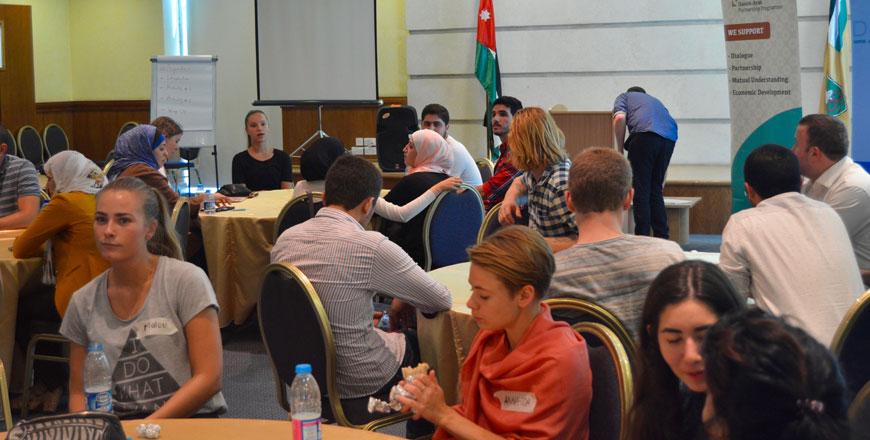You are here
Conference participants call for bridging gap between academia, job market
By Khetam Malkawi - May 25,2014 - Last updated at May 25,2014
AMMAN — The lack of practical training and poor communication skills are some of the problems that university students believe make it more difficult for them to join the labour market after graduation.
Participants at the Bridge Building Conference, which was held earlier this week, said there should be cooperation between academic institutions and private sector companies to prepare fresh graduates to join the labour market immediately after graduation.
They noted that the number of graduates from certain faculties is higher and does not match the vacancies available in the job market, which makes it difficult for the majority to find jobs.
Some participants in the conference, organised by the Danish-Jordanian University Cooperation Project (DJUCO), also called for updating and changing the curricula to match market needs.
Bo Vestergaard Thiesen, DJUCO project manager, said the programme was launched in 2009 with the aim of developing academic cooperation between Jordan and Denmark. It targets scholars and students from both countries.
“We discuss different subjects to create academic dialogue between Jordan and Denmark, in addition to Europe in general and the Middle East,” Thiesen said.
The project, which is implemented in cooperation between the Centre for Contemporary Middle East Studies at the University of Southern Denmark and Jordanian universities, also aims at increasing educational exchange between the involved universities.
“Annually we select 10 to 12 students from the Prince Al Hussein Bin Abdullah II School of International Studies at the University of Jordan in the fall semester to participate in a course taught mainly in Jordan but also in Denmark for two weeks, for Jordanian students to experience the education there,” Thiesen told The Jordan Times on the sidelines of the conference.
He said the Bridge Building Conference brings stakeholders and students together to come up with a solution to bridge the gap between the output of universities and the requirements of the job market.
“There is a huge gap between what students are being taught at university and the needs of the labour market,” Thiesen noted, adding that this problem also exists in his country.
Unemployment among young Jordanians is almost twice the global average and stands at 24.1 per cent according to a recent study launched by the International Labour Organisation in cooperation with the Department of Statistics.
The survey showed that long-term unemployment — one year or more — affects 55.8 per cent of the currently unemployed, and the percentage of unemployed young Jordanians who have been looking for work for at least six months is 72.4 per cent.
It added that most male jobseekers (61.2 per cent) have completed only primary education and are struggling to find employment.
Related Articles
AMMAN — Young Jordanians and Danes met in Amman on Tuesday to share knowledge and talk about their ambitions and opinions under the theme of
AMMAN — Universities should devise technical and vocational curricula to prepare graduates for the labour market, Minister of Education Wali
The ICT Association of Jordan (int@j) on Tuesday said an agreement signed this week between Jordanian universities and the International Finance Corporation (IFC) will play a key role in reducing unemployment among ICT graduates.















